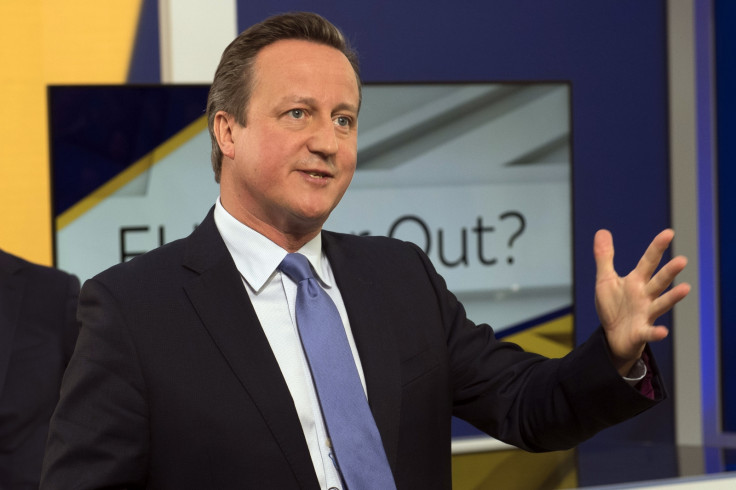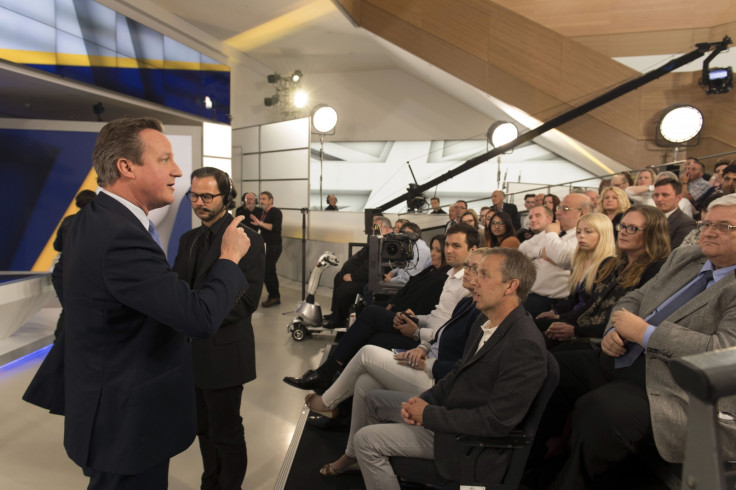EU referendum: It's all about the economy says David Cameron
Prime Minister David Cameron made his case for why the UK should remain in the Europen Union in a one-hour television interrogation, hosted by Faisal Islam and subjected to a live studio audience. Cameron, who has risked his political career on gambling the electorate will vote to remain within the EU, made a robust case for Britain's continuing membership — and got in a few sly digs at the Brexit camp.
Firstly, Faisal asked him how many EU nationals had arrived since he became prime minister. Luckily Cameron had the figures to hand and said although there were challenges from high migration, to leave would damage the UK economy far more. He then had to explain why he had failed to bring net immigration down to under 100,000 a year, couching it in positive terms: the UK was attractive to migrants and two million jobs had been created in the last parliament.
Again and again, Cameron returned to the economy, which he said is at great risk if the UK leaves the EU. Whether discussing the NHS, housing or trade, he kept bringing the conversation round to the economy — where he knows he is on surer ground than the Vote Leave camp.
The first half was fairly bland, with just one big laugh — when Faisal asked which would come first in the event of the UK leaving — World War III or a global recession. Having laughed it off Cameron made the serious point that for all the EU's flaws, it was still remarkable that 70 years after the last nation wars, now sat and talked to each other.

In part two of the programme, Cameron fielded a wide variety of questions and handled most of them well - though he was accused of waffle by an English Lit student. Asked about Turkey joining the EU, Cameron was adamant that it wouldn't happen for many decades, if ever at all. Asked about the increasing strain on the NHS Cameron also pointed out that 50,000 EU nationals work in the NHS.
Asked if Boris Johnson would make a good premier, Cameron was tactful, saying he didn't get to pick the next PM but that Boris was a very talented guy. He also refuted the suggestion he was scaremongering and that his reputation has suffered as a result of the campaign.

Cameron said the UK would be more secure within the EU, mentioning the European Arrest Warrant and shared intelligence which he said had become far more important over the last 10 years. He summarised by asking voters to remember their children when they cast their vote — and not to roll a dice.
According to some opinion polls,the majority of people will vote to leave in the referendum on 23 June. However there are still many undecided as to which way to vote. Whether Cameron's smooth performance will persuade them one way or the other remains to be seen. Tomorrow (3 June) Michael Gove, co-leader of the Vote Leave camp - will face his own grilling on Sky News.
This studio audience though 🙈 Cameron should do more of this, I’m not a fan but he’s giving direct, intelligent responses #InOrOut
— Hanna Newton (@HannaCNewton) June 2, 2016
Cameron is sounding like a broken record, banging on about a shrinking economy and higher weekly shops if we leave the EU
— Bex (@Bex118) June 2, 2016
"@EuroGuido: WATCH: David Cameron's WW3 Brexit Claims Laughed Out of Debate https://t.co/wChjosNzlC"comedy gold
— Marky Mark (@mej44) June 2, 2016
Do you watch Cameron on Sky or England v Portugal? To be fair both are just a prelude to f-ing it up in Europe later this month.
— Journal Velo (@JournalVelo) June 2, 2016
© Copyright IBTimes 2025. All rights reserved.






















